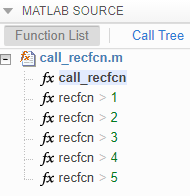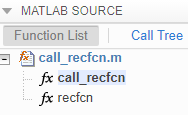Force Code Generator to Use Run-Time Recursion
When your MATLAB® code includes recursive function calls, the code generator uses compile-time or run-time recursion. With compile-time recursion, the code generator creates multiple versions of the recursive function in the generated code. These versions are known as function specializations. With run-time recursion, the code generator produces a recursive function. If compile-time recursion results in too many function specializations or if you prefer run-time recursion, you can try to force the code generator to use run-time recursion. Try one of these approaches:
Treat the Input to the Recursive Function as a Nonconstant
Consider this function:
function y = call_recfcn(n) A = ones(1,n); x = 5; y = recfcn(A,x); end function y = recfcn(A,x) if size(A,2) == 1 || x == 1 y = A(1); else y = A(1)+recfcn(A(2:end),x-1); end end
call_recfcn calls recfcn with the value 5 for the second argument. recfcn calls itself recursively until x is 1. For each recfcn call, the input argument x has a different value. The code generator produces five specializations of recfcn, one for each call. After you generate code, you can see the specializations in the code generation report.

To force run-time recursion, in call_recfcn, in the call to recfcn, instruct the code generator to treat the value of the input argument x as a nonconstant value by using coder.ignoreConst.
function y = call_recfcn(n) A = ones(1,n); x = coder.ignoreConst(5); y = recfcn(A,x); end function y = recfcn(A,x) if size(A,2) == 1 || x == 1 y = A(1); else y = A(1)+recfcn(A(2:end),x-1); end end
After you generate code, in the code generation report, you see only one specialization.

Make the Input to the Recursive Function Variable-Size
Consider this code:
function z = call_mysum(A) %#codegen z = mysum(A); end function y = mysum(A) coder.inline('never'); if size(A,2) == 1 y = A(1); else y = A(1)+ mysum(A(2:end)); end end
If the input to mysum is fixed-size, the code generator uses compile-time recursion. To force the code generator to use run-time conversion, make the input to mysum variable-size by using coder.varsize.
function z = call_mysum(A) %#codegen B = A; coder.varsize('B'); z = mysum(B); end function y = mysum(A) coder.inline('never'); if size(A,2) == 1 y = A(1); else y = A(1)+ mysum(A(2:end)); end end
Assign Output Variable Before the Recursive Call
The code generator uses compile-time recursion for this code:
function y = callrecursive(n) x = 10; y = myrecursive(x,n); end function y = myrecursive(x,n) coder.inline('never') if x > 1 y = n + myrecursive(x-1,n-1); else y = n; end end
To force the code generator to use run-time recursion, modify myrecursive so that the output y is assigned before the recursive call. Place the assignment y = n in the if block and the recursive call in the else block.
function y = callrecursive(n) x = 10; y = myrecursive(x,n); end function y = myrecursive(x,n) coder.inline('never') if x == 1 y = n; else y = n + myrecursive(x-1,n-1); end end